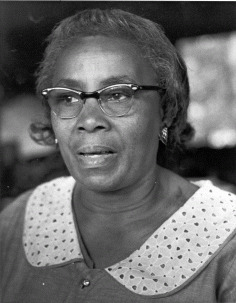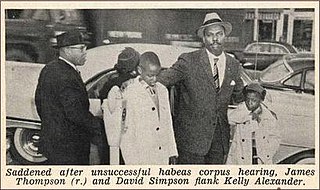
Isaac W. Williams (1945-2008), born in Charleston, South Carolina, was an activist with the NAACP. [1]

Isaac W. Williams (1945-2008), born in Charleston, South Carolina, was an activist with the NAACP. [1]
Williams was born the seventh child of eleven in the predominantly African-American Union Heights area of Charleston, South Carolina. [2]
Williams graduated from Bonds-Wilson High School in Charleston County in 1963. He also graduated from South Carolina State College with a degree in biology. [3] The Army ROTC commissioned Williams in 1967, and he served on active duty in the United States from 1967 to 1969. [2] [3]
Williams was a prolific NAACP activist throughout his life, particularly during the civil rights movement of the 1960s. His participation in protest actions such as sit-ins resulted in his being jailed over 17 times during that time. His efforts focused on police use of force, inadequate minority housing, and minority education, among other things. [3]
Williams's involvement with the NAACP started around 1960 when he was in tenth grade at Bonds-Wilson. At that time, he served as president of the North Charleston youth chapter of the NAACP. [2] In a 2003 interview, he recalled arranging for civil rights lawyer Matthew J. Perry to give a speech for his chapter in 1960, describing it as a significant formative event for him. [2]
During his college years, Williams served as the president of the NAACP's South Carolina Conference Youth Division from 1963 to 1967, as well as chairman of the NAACP National Youth Work Committee in the 1965–1967. [3] In 1967, as senior class president, he led a student uprising at South Carolina State University (then South Carolina A&M College), protesting college president Benner C. Turner. The protest lasted two weeks and approximately 80% of the student body participated. [4] [5] Turner resigned in 1968 as a result of the pressure. [6]
From 1969 to 1983, Williams was the Field Director of the NAACP in South Carolina. [3]
In March 1982, Williams was arrested on gambling and drug charges with five other men following a raid on the home of his friend, Willie Fleming. [7] The drug charges against all the men were dropped shortly after the arrests. The gambling charges were dismissed on April 27, 1982 but were refiled on April 29. [8] Williams described the refiling as harassment and stated he felt the police were overreacting to the situation. [8] Williams and his co-defendants were acquitted of all charges on June 18, 1982. He described it as a learning experience, stating it taught him a lesson about the amount of scrutiny that black leaders are under. [9]
In 1991, Williams led the election campaign for Rep. Jim Clyburn. [2] [10] After Clyburn was elected, Williams served as his chief congressional aide. Williams held the position until his death from a stroke in 2008. [11]

The 1954–1968 civil rights movement in the United States was preceded by a decades-long campaign by African Americans and their like-minded allies to end legalized racial discrimination, disenfranchisement and racial segregation in the United States. The movement has its origins in the Reconstruction era during the late 19th century, although it made its largest legislative gains in the mid-1960s after years of direct actions and grassroots protests. The social movement's major nonviolent resistance and civil disobedience campaigns eventually secured new protections in federal law for the human rights of all Americans.

James Enos Clyburn is an American politician and retired educator serving as a Democratic member of the U.S. House of Representatives from South Carolina. He has served as House Majority Whip since 2019. He is a two-time Majority Whip, previously serving in the post from 2007 to 2011, and served as House Assistant Minority Leader from 2011 to 2019.

Robert Franklin Williams was an American civil rights leader and author best known for serving as president of the Monroe, North Carolina chapter of the NAACP in the 1950s and into 1961. He succeeded in integrating the local public library and swimming pool in Monroe. At a time of high racial tension and official abuses, Williams promoted armed Black self-defense in the United States. In addition, he helped gain support for gubernatorial pardons in 1959 for two young African-American boys who had received lengthy reformatory sentences in what was known as the Kissing Case of 1958. It generated national and international attention and criticism of the state.
The civil rights movement (1896–1954) was a long, primarily nonviolent action to bring full civil rights and equality under the law to all Americans. The era has had a lasting impact on American society – in its tactics, the increased social and legal acceptance of civil rights, and in its exposure of the prevalence and cost of racism.

Septima Poinsette Clark was an African American educator and civil rights activist. Clark developed the literacy and citizenship workshops that played an important role in the drive for voting rights and civil rights for African Americans in the Civil Rights Movement. Septima Clark's work was commonly under-appreciated by Southern male activists. She became known as the "Queen mother" or "Grandmother" of the Civil Rights Movement in the United States. Martin Luther King Jr. commonly referred to Clark as "The Mother of the Movement". Clark's argument for her position in the Civil Rights Movement was one that claimed "knowledge could empower marginalized groups in ways that formal legal equality couldn't."
The Friendship Nine, or Rock Hill Nine, was a group of African-American men who went to jail after staging a sit-in at a segregated McCrory's lunch counter in Rock Hill, South Carolina in 1961. The group gained nationwide attention because they followed the 1960 Nashville sit-in strategy of "Jail, No Bail", which lessened the huge financial burden civil rights groups were facing as the sit-in movement spread across the South. They became known as the Friendship Nine because eight of the nine men were students at Rock Hill's Friendship Junior College.

The Kissing Case is the arrest, conviction and lengthy sentencing of two prepubescent African-American boys in 1958 in Monroe, North Carolina. A white girl kissed each of them on the cheek and later told her mother, who accused the boys of rape. The boys were then charged by authorities of molestation. Civil rights activists became involved in representing the boys. The boys were arrested in October 1958, separated from their parents for a week, beaten and threatened by investigators, then sentenced by a Juvenile Court judge.
Jibreel Khazan is a civil rights activist who is best known as a member of the Greensboro Four, a group of African American college students who, on February 1, 1960, sat down at a segregated Woolworth's lunch counter in downtown Greensboro, North Carolina challenging the store's policy of denying service to non-white customers. The protests and the subsequent events were major milestones in the Civil Rights Movement.

The 2002 United States House of Representatives elections in South Carolina were held on November 5, 2002 to select six Representatives for two-year terms from the state of South Carolina. The primary elections for the Democrats and the Republicans were held on June 11 and the runoff elections were held two weeks later on June 25. All five incumbents who ran were re-elected and the open seat in the 3rd congressional district was retained by the Republicans. The composition of the state delegation remained four Republicans and two Democrats.
Julius Waties Waring was a United States District Judge of the United States District Court for the Eastern District of South Carolina who played an important role in the early legal battles of the American Civil Rights Movement. His dissent in Briggs v. Elliott was foundational to Brown v. Board of Education.

The National Association for the Advancement of Colored People (NAACP) is a civil rights organization in the United States, formed in 1909 as an interracial endeavor to advance justice for African Americans by a group including W. E. B. Du Bois, Mary White Ovington, Moorfield Storey and Ida B. Wells.

This article examines South Carolina's history with an emphasis on the lives, status, and contributions of African Americans. African slaves first arrived in the region in 1526, and the institution of slavery remained until the end of the Civil War in 1865. Until slavery's abolition, the free black population of South Carolina never exceeded 2%. Beginning during the Reconstruction Era, African Americans were elected to political offices in large numbers, leading to South Carolina's first majority-black government. Toward the end of the 1870s however, the Democratic Party regained power and passed laws aimed at disenfranchising African Americans, including the denial of the right to vote. Between the 1870s and 1960s, African Americans and whites lived segregated lives; people of color and whites were not allowed to use the same schools or public facilities. African Americans were treated as second-class citizens leading to the civil rights movement in the 1960s. In modern America, African Americans constitute 22% of the state's legislature, and in 2014, the first African American U.S. Senator since Reconstruction, Tim Scott, was elected. In 2015, the Confederate flag was removed from the South Carolina Statehouse after the Charleston church shooting.
Stanley E. Branche was an American civil rights leader from Pennsylvania who worked as executive secretary in the Chester, Pennsylvania branch of the National Association for the Advancement of Colored People (NAACP) and founded the Committee for Freedom Now (CFFN).
The Greenville Eight was a group of African American students, seven in high school and one in college, that successfully protested the segregated library system in Greenville, South Carolina in 1960. Among the eight was Jesse Jackson, a college freshman. As a result of the staged sit-in, the library system in the city integrated.
Prior to the civil rights movement in South Carolina, African Americans in the state had very few political rights. South Carolina briefly had a majority-black government during the Reconstruction era after the Civil War, but with the 1876 inauguration of Governor Wade Hampton III, a Democrat who supported the disenfranchisement of blacks, African Americans in South Carolina struggled to exercise their rights. Poll taxes, literacy tests, and intimidation kept African Americans from voting, and it was virtually impossible for someone to challenge the Democratic Party, which ran unopposed in most state elections for decades. By 1940, the voter registration provisions written into the 1895 constitution effectively limited African-American voters to 3,000—only 0.8 percent of those of voting age in the state.
The New Year's Day March in Greenville, South Carolina was a 1,000-man march that protested the segregated facilities at the Greenville Municipal Airport, now renamed the Greenville Downtown Airport. The march occurred after Richard Henry and Jackie Robinson were prohibited from using a white-only waiting room at the airport. The march was the first large-scale movement of the civil rights movement in South Carolina and Greenville. The march brought state-wide attention to segregation, and the case Henry v. Greenville Airport Commission (1961) ultimately required the airport's integration of its facilities.

The Dr. Cyril O. Spann Medical Office, located in Columbia, South Carolina, served African-American patients during de jure and de facto racial segregation in the United States. Built in 1963, it was added to United States National Register of Historic Places on May 20, 2019.